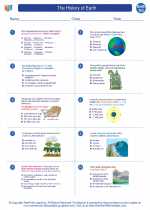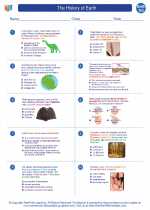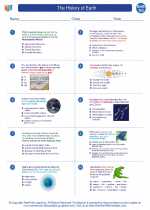The History of Earth -> nickel
Nickel: Overview
Nickel is a lustrous, silvery-white metal with a slight golden tinge. It belongs to the transition metals and is located in Group 10 of the periodic table. Its atomic number is 28 and it has the symbol Ni.
Physical Properties of Nickel
- Atomic Number: 28
- Atomic Mass: 58.6934 amu
- Melting Point: 2,651 degrees Fahrenheit (1,455 degrees Celsius)
- Boiling Point: 5,275 degrees Fahrenheit (2,913 degrees Celsius)
- Density: 8.91 grams per cubic centimeter
- Hardness: Nickel is a hard metal, ranking 4 on the Mohs scale.
Chemical Properties of Nickel
- Symbol: Ni
- Electron Configuration: [Ar] 3d8 4s2
- Oxidation States: Nickel can exist in various oxidation states, including +2, +3, and +4.
- Reactivity: Nickel is relatively unreactive under normal conditions but can slowly react with dilute acids.
Occurrence and Uses
Nickel is found in the Earth's crust and is predominantly mined from two types of ore deposits: laterites and sulfide deposits. It is widely used in various industrial applications, including the production of stainless steel, alloy materials, rechargeable batteries, and as a catalyst in chemical reactions. Additionally, nickel is used in the minting of coins and in the production of nickel-based superalloys for high-temperature applications.
Environmental and Health Considerations
While nickel is an essential element for many living organisms, excessive exposure to nickel and its compounds can have harmful effects on human health and the environment. Inhalation or ingestion of nickel particles can cause respiratory and gastrointestinal issues, and prolonged exposure to high levels of nickel may lead to allergic reactions and skin sensitization. Environmental concerns related to nickel mining and processing include habitat destruction and potential water and soil contamination.
Study Guide Questions
- What is the atomic number of nickel?
- Describe the physical properties of nickel, including its melting point, boiling point, density, and hardness.
- What is the electron configuration of nickel?
- What are the primary uses of nickel in industrial applications?
- Discuss the environmental and health considerations associated with nickel.
◂Earth Science Worksheets and Study Guides High School. The History of Earth

 Worksheet/Answer key
Worksheet/Answer key
 Worksheet/Answer key
Worksheet/Answer key
